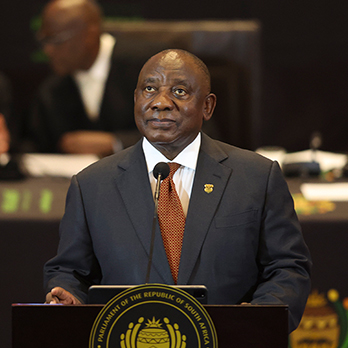SEIFSA’s Collective Bargaining Summit to get to grips with labour issues in Metal Industries
The steel and engineering sector will have a chance to analyse and constructively debate the pros and cons of current collective bargaining practices that have dominated the manner in which employers and trade unions have engaged one another in the sector over the past 60 years at the Metal Industries Collective Bargaining Summit at Emperors Palace on May 24 and 25 2023.
The summit, organised by the Steel and Engineering Industries Federation of Southern Africa (SEIFSA), will see captains of industry, union leaders, senior government ministers and expert analysts discuss the many challenges facing the sector, including crucial debates around conditions of employment and labour costs. Employee costs make up 20% of total costs in the metals and engineering sector.
“A well-functioning economy needs business, labour and government to be in agreement in terms of policy. Our economy has been under enormous pressure since the global financial crisis; we are dealing with crippling youth unemployment, a sub-investment status, stagnant growth and the lingering effects of the Covid-19 pandemic. We hope the summit will plant the seed amongst all stakeholders that in order to begin addressing our many challenges, we need to find a better way of working together,” says SEIFSA CEO Lucio Trentini.
Speakers and panellists across the business, labour and government divide will debate a wide range of issues that underpin the current collective bargaining model, the importance of labour market stability in unlocking economic growth and developing a shared vision on how together we potentially can move forward; topics to be covered include the following:
- Very tough times ahead if we do not turn this ship around — and fast by Dr David Masondo, Deputy Minister of Finance;
- The implications of declining union representation in bargaining councils by Thulas W Nxesi, the Minister of Employment;
- The relevance of the current form of central wage bargaining by Afzul Soobedaar, Director at Perispec Consulting;
- Democratisation of the workplace and the strategic importance of what transformation means in the industry and economy by NUMSA General Secretary Irvin Jim;
- Opportunity for unions to re-emerge as a united force? by Gideon du Plessis, General Secretary of Solidarity; and
- What is the future of trade unions and collective bargaining in a reimagined industrial relations framework? by Jonathan Goldberg, Chief Executive Officer of Global Business Solutions.
Macsteel, RMA and Cachalia Capital have put their weight behind the Metal Industries Collective Bargaining Summit as partners, with Engineering Weekly the Summit’s official media partner.
“If we are to put our economy back on track, it is crucial that decision makers from business, labour and government discuss these issues with a view to addressing the many challenges that face us; the Metal Industries Collective Bargaining Summit offers the opportunity to do this,” says Trentini.
President Ramaphosa welcomes constructive engagement with steel sector
President Cyril Ramaphosa met with business leaders in the steel and engineering industries on 18 April 2023 to discuss measures that government, the industry and other social partners will take together to grow the sector and ensure its future sustainability.
President Ramaphosa met with the Steel and Engineering Industries Federation of Southern Africa (SEIFSA) led by Chairperson, Mr Elias Monage, at the Union Buildings in Tshwane. The purpose of the meeting was to deepen engagement between government and this strategic sector of the economy. The meeting was the first direct engagement between a South African Head of State and the sector since SEIFSA’s formation almost 80 years ago.
In the first State of the Nation Address of the 6th Administration, in 2019, President Ramaphosa directed that the sector be given specific focus through the development of a steel and metal fabrication master plan. In June 2021 the Department of Trade, Industry and Competition signed the sector master plan, which provides a blueprint for the industry to revitalise and expand production.
The master plan is a key part of the reimagined industrial strategy which President Ramaphosa has championed to unleash private investment and support inclusive growth.
“The steel sector is at the heart of our economy, as it has a significant multiplier effect and is one of largest job creators in the manufacturing sector. Our infrastructure drive should be the catalyst that propels its recovery and growth. We are determined to build a local steel sector that is strong, competitive and well positioned for the future”, said President Ramaphosa.
The President outlined the actions being taken to achieve energy security, improve the performance of the freight logistics system and tackle corruption and crime, which have received strong support from business leaders. Government and industry representatives discussed opportunities for local steel in the effort to rehabilitate the rail network, expand the national transmission grid and build water infrastructure, as well as the need to invest in skills development.
The SEIFSA leadership expressed its support in working with government and other social partners to address the country’s challenges and unlock investment in the sector.
The lack of qualified Artisans is a constraint to Economic Growth
A functioning economy must have a sufficient number of artisans if it is to fulfill its economic potential. From energy and water to transport and logistics, all key sectors of the economy are dependent on a ready supply of artisans.
Although South Africa remains woefully short of artisan skills, this reality is no stranger to the South African government. In November 2022, the Minister of Higher Education, Science and Innovation Dr. Blade Nzimande warned that South Africa needs at least 60% of school leavers to pursue training in a trade to meet the country’s demand for scarce skills.
Dr. Nzimande at the 2022 Centres of Specialisation (COS) Artisan Graduation Ceremony, stated: “We honestly need to do more to encourage school leavers to pursue technical trades, as government expands technical and vocational education. This is amongst the reasons why there is a continuous need for suitably qualified artisans to sustain industries and support economic growth in South Africa,”
The Department of Home Affairs has also made a concerted effort to attract critical skills to the country by adding seven trades to the latest critical skills list, which was released in August 2022. The inclusion of trades in the critical skills list highlights the shortage of these skills and affords foreign nationals with these skills an opportunity to apply for critical skills work visas.
This may appear contradictory, when considering the country’s unacceptably high levels of unemployment, however, the issue is that these are skills the economy urgently needs and are not readily available locally
The President in the State of the Nation Address in February 2023 sated: “One of the key ingredients for economic growth and competitiveness is the ability to attract skills which the economy needs. Having completed a comprehensive review of the work visa system, we will move quickly to implement the recommendations put forward.”
According to the requirements of the government’s National Development Plan (NDP) and White Paper for Post-School Education and Training, South Africa should be producing 30,000 qualified artisans per year by 2030. This will remain a pipe dream if there is no synergy, strategy and agreed action plan between the main role players to see the Decade of the Artisancampaign being achieved.
South Africa faces two main problems when it comes to the shortage of artisans. Firstly, older experienced artisans who are over the age of 55 are retiring, while those in their 30s and 40s are taking advantage of the global portability and demand for their skills and immigrating. In addition, the 36.5% decline in the total number of learners who enter artisanal learning programmes during the 2020/21 financial year is also a major concern.
Secondly, and compounding the problem further, is that younger newly qualified artisans lack the experience to substitute to the leavers. Moreover, the appalling formal education system produces matriculants who lack the maths and science literacy required to get to grips with the demands of many trade programmes.
This leaves the country with a gap in the market of about 20 years and no pipeline of younger suitably qualified artisans ready to join the workforce, build their careers and contribute to economic growth.
For the country to produce what the National Artisan and Apprenticeship Development Strategy 2030 dubbed as the 21st Century Artisan (A21), there needs to be: a functional system that ensures exposure for learners in artisanal programmes to the theoretical aspect of their trade; simulation (practical) and experiential learning (on-the-job training); and a clear acknowledgment that one or two parts of these components is simply inadequate – all artisans in training need immersion in all these aspects to eventually become A21 Artisans.
For this process to succeed, a strong ongoing partnership between three crucial role players must be mapped, implemented and monitored on an ongoing basis:
- Industry/workplaces;
- Sector Education and Training Authorities (SETAs); and
- Skills Development Providers and reputable Training Centres, such as the SEIFSA Training Centre.
The Government also plays a major overarching role - it needs to be the glue that binds these three important stakeholders together by providing the necessary regulatory and enabling framework.
Zizile Lushaba is Human Capital & Skills Development Executive at the Steel and Engineering Industries Federation of Southern Africa (SEIFSA).
Its time to rebuild trust
In my last note I put a challenge to our employer colleagues on the Metals and Engineering Industries Bargaining Council (MEIBC) that given that our economy is on its knees – now would be a good time to rise above the rhetoric and play a more constructive role in the affairs of the Council. After all, I said, employers represented by the Employer Organizations on the MEIBC have far more in common than what they think.
If we are going to survive this current crisis, we know that government is pinning its hopes of an economic revival on the private sector. The President is well aware that he cannot solve the country’s problems alone. The state needs the private sector to step up in a big way.
For South Africa, our economy and the metals and engineering industries to dig itself out of the current crisis, business has to take the lead.
Whilst it is up to employers to keep the wheels of industry turning, the job of all role players on the MEIBC is to create a predictable, stable policy environment and for this to succeed requires trust.
Over the last ten years, trust between employer organizations on the bargaining council has all but been eroded. This has severely hampered the work of the bargaining council, has almost led to its liquidation and created a toxic and dysfunctional operating environment that has made it impossible to even begin addressing the real challenges facing our sector.
The MEIBC, once the benchmark, for all Bargaining Councils, is today a shadow of its former self, lurching from one crisis to the next. Staff are demoralized, many have left and it’s a miracle that they have been able to keep the doors open, given that their existence depends solely on two income streams, the administration and dispute levy, both of which were last reviewed in 2011.
Bargaining Council are created by the parties that sit-on them, to provide a platform to conclude agreements covering terms and conditions of employment, including social security benefit fund agreements. More importantly, the platform created by a bargaining council, in bringing organized business and labour around a single table, in an atmosphere of collaboration and joint problem solving ideally should be aimed at highlighting, debating and addressing the many obstacles standing in the way of meaningful interventions in moving the needle forward on job retention, creation and economic prosperity.
This sadly, has not been the case on our Bargaining Council for many years. It serves no purpose to allocate who is mainly, partly or not at all to blame for this sorry state of affairs. As participants and I refer specifically to the employer representatives on the Council, are all culpable, in varying degrees.
The point here is that trust needs to be rebuilt, not so much as between the trade unions themselves or in the engagement process between trade unions and employers but instead amongst the different employer groupings on the Council.
This is where the relationship, dynamic and mind-set to move forward has completely broken down. It’s a tragedy that more often than not unions on the MEIBC are able to find a single unified voice as opposed to the differing and bickering voices that make up the employer bloc.
Trust is built over time and requires a level of transparency that has not been forthcoming from within the employer bloc. Rebuilding trust is difficult, but is vital if the MEIBC is to play a pivotal role in facilitating meaningful and constructive dialogue between all social partners.
The stakes are higher than they have ever been. Our economy is under siege as it battles a job, growth and hunger crisis. A devastating 63.9% of South Africans under the age of 24 are unemployed, consumer inflation is at a 13 year high and one in four people live below the food poverty line.
Employer representatives, duly elected by their respective constituencies, simply cannot afford to play fast and loose with the trust members have invested.
It’s high time employer representatives elected to serve on the Council bury the hatchet and take a step forward and ask: how can we make a meaningful contribution to the crisis facing our sector, how can we pull together and build the MEIBC that we are supposed to serve and finally, how can we move beyond our narrow and fixed paradigms.
I believe we have no choice; we can continue to quibble, disagree and look to score points off one another or we can wipe the slate clean and start afresh. The choice is quite simple, change the paradigm or continue on the path to eventual insignificance.
Who is prepared to lay down their arms (figuratively speaking) and take a seat at the table with a view on focusing on what unites us as opposed to what keeps us apart?
Lucio Trentini
SEIFSA Chief Executive
Applying for exemption from the Main Agreement leave enhancement pay
Section 14 of the Main Agreement provides that every employee is entitled to leave enhancement pay calculated on the basis of 8.33 percent of actual earnings excluding allowances. This pay is calculated on a 40-hour work week or upon the actual normal hours worked on the date that the employee actually goes on leave.
Exemptions procedure
SEIFSA is aware that the current economic environment may pose severe constraints on some member companies’ ability to pay the leave enhancement pay. Members are advised, in this regard, that the industry’s current leave enhancement pay exemption procedure continues to apply.
A company that is unable to pay the leave enhancement pay may submit an application to its local Regional Council for exemption from paying the leave enhancement pay.
The exemption procedure is outlined in Appendix A.
It is important to note that an exemption application must be lodged with the bargaining council by no later than 31 October 2022.
This means that companies wishing to apply for exemption must do so without delay, failing which the trade unions may refuse to consider any such late applications.
Exemption application questionnaire
A pro-forma exemption questionnaire is contained in Appendix B.
A company wishing to apply for an exemption must complete the questionnaire in its entirety and return all the necessary documentation to the bargaining council by no later than 31 October 2022.
Management’s attention is drawn to the importance of the Council’s requirement that an application must be accompanied by the following important information in order for the application to be considered:
- A fully detailed motivation explaining the difficulties that the company is experiencing and hence the need for the application. This motivation is not the same as the business plan (see point 2 below).
- Audited Financial Statement for the financial year ending 2021/ 2022. In the case of a closed corporation - a full set of Financial Statements which are to be signed by an Accounting Officer and the latest Management Accounts for the last three months. If the Financial Statements are older than six months, then the Management Accounts for the recent three months are required.
- Formal confirmation that employees were informed of the company’s decision to make an application for exemption.
- Where employees reject the company’s approach, they are to be informed of their right to submit written reasons for objecting to the exemption application and such reasons should be attached as an annexure to the company’s application.
- The signature of at least two employees who accept being the representatives for the workforce and who will be affected by the application. Representatives of the workforce are to sign the form, contained in the exemption application questionnaire, consenting to this.
- The signatures of employees accepting that they have been informed of the implications of what the firm is proposing to the Council.
- Where the employees are trade union members, the company should inform the local trade union office of the intention to apply for an exemption and request, in writing, a meeting with the local official to discuss the impact of the exemption on the company and the members of the union.
- Where employees have elected a trade union representative or representatives (shop stewards) these persons should be requested to sign that they were consulted and that they understand the need for applying for the exemption. Where the local trade union official and/or shop stewards have been consulted and where they reject the application, such refusal must be recorded in the application and countersigned by at least two witnesses.
- Where the local trade union official and/or shop stewards and affected employees support the exemption application, this signed agreement should be included with the application.
- It is recommended that all meetings in this regard between management, employees, shop stewards and union officials be minuted and that the minutes of such meetings be submitted with the exemption application.
- The application itself is to be signed by either a Director of the firm, Member, Owner or a Senior Accountant - neither a Bookkeeper nor the Human Resources Manager’s signatures will be acceptable.
- The savings in cost to company should the application for exemption be granted and the workings in arriving at this cost.
Please Note:
- The exemption application will not be considered or processed by the bargaining council unless all the above requirements are met.
- It is not a condition of the exemption that employees accept the proposed exemption. All that is required is that employees and their representatives are fully informed of the company’s intention to apply for exemption and that this consultation process and their response thereto is formally recorded and submitted with the application.
- If granted, the employer shall then be obliged to become a compulsory contributor to the Bargaining Council’s monthly contribution scheme.
Condonation application
- Where companies have failed to make the exemption application before 31 October 2022, they may apply for condonation.
- In the application, companies will be required to inform the Bargaining Council of the following:
- Degree of lateness (days/months)
- Reason for lateness;
- Prospects of success;
- Potential prejudice to be suffered by the company if the application is not granted; and
- Any other information that may be relevant in assisting their application.
Please note: that the Condonation Application must be signed before a Commissioner of Oaths.
- A copy of the Condonation Application is attached marked Appendix C
Application Forms
Download forms below
- Application for exemption from metal and engineering industries bargaining council
- Employee / Trade Union Acknowledgment of this Application
- Application for exemption from the metal and engineering industries bargaining council
The economy cannot afford a strike at Transnet
SEIFSA understand all too well the consequences of industrial action in the context of wage bargaining. A four-week strike in 2014 followed by a three-week strike last year left many an employer on the brink of contemplating closure.
Arguing that the right to strike is enshrined in our constitution and strike action is a functioning mechanism of collective bargaining is ignoring the obvious and avoiding reality. South Africa is on its knees. The stakes are higher than they have ever been. Our economy is under siege as it battles a job, growth and hunger crisis. A devastating 63.9% of South Africans under the age of 24 are unemployed, consumer inflation is at a 13 year high and one in four people live below the food poverty line.
A full-blown strike at Transnet, which seems unavoidable, will have a serious effect on the economy, it will halt exports and put thousands of jobs on the line. Under the current harsh economic climate, Transnet as with Eskom, is crucial to the country’s economy. Transnet’s rail and port facilities are key to exporting the country’s bulk commodity exports such as coal, iron ore, chrome and manganese.
Exporters rely heavily on efficient rail networks and ports, but as we know, Transnet has been operating below capacity for years as it grapples with a shortage of locomotives, cable theft, vandalism, poor maintenance and outdated and slow port infrastructure. This substandard service has had a significant impact on the local steel industry and its ability to manufacture steel to meet its customers’ demands. In some instances, primary steel producers have had to shut down operating plants due to the unavailability of raw materials, at great cost to their businesses and the economy.
A full-blown strike at Transnet, will add to the damage suffered by the South African economy. This will be as bad as load-shedding in terms of economic impact. For an economy battling to maintain momentum this could well be the final nail in the coffin.
With load-shedding being reintroduced as from today, workers threating to paralyze Transnet and Transnet having already declared force majeure, we appeal for a constructive approach that seeks to advance the interests of our country.We know that it will not be easy to make compromises, but we appeal nevertheless for a win-win approach to the negotiations, as opposed to a winner-takes-all approach. Our plea to all the negotiators, and to those from whom they obtain their mandates, is that you rise above your narrow interests and put the interests of the South African economy first, and look to settle quickly.
Lucio Trentini
SEIFSA Chief Executive Officer
Finally, Main Agreement Gazetted
Friday, 7 October 2022 The Minister of Employment and Labour gazetted the Metal Industry Consolidated Main Agreement today thereby making it legally binding on all employers and employees who are subject to the agreement’s scope of application.
This brings to an end a journey that began more than a decade ago – costing many millions of rands, occupying far too much court time and, quite frankly, could have been avoided.
After many rounds of litigation, the fact remains we have an agreement covering terms and conditions of employment, supported by the overwhelming majority of employees who are members of the trade unions (represented on the Bargaining Council) and the overwhelming majority of factory workers employed by employers who are members of one or other employer organizations represented on the Council. I have no doubt, however, that legal challenges will continue all the way to the Constitutional Court.
Whilst the Main Agreement has been unfairly and mischievously characterized as a SEIFSA / NUMSA Agreement, this couldn’t be furthest from the truth. The Agreement enjoys the support of five of the biggest trade unions in the industry, including NUMSA and the support of 18 independent Employer Organizations, in addition to the Consolidated Employers Organization (CEO), who on their own represent in excess of 6 70 employers employing well over 14 000 employees.
Whilst we acknowledge the right of our detractors to continue in their quest to have the agreement declared a nullity, our critics would be best advised to do some introspection and ask themselves what have they been doing for the last twenty years, participating on a forum that is designed and created to support centralized collective bargaining.
Bargaining Council by their very nature are created to uphold standards of fair play and decency, in the hope that every employer is free to run a business in a climate of industrial peace, stability, certainty and workers free to earn a decent wage from an honest day’s work. Bargaining Councils are designed to bring together employers and trade unions with the very purpose of concluding agreements that both sides can live with. This year we witnessed the coming together of NUMSA and the Plastic Convertors Association (PCA), the creation of their own bargaining chamber and the signing-off of their own collective agreement, operating under the auspices of the MEIBC. This agreement too, has been gazetted and extended to all employers and employees in the plastic sector of the metals industry.
This chamber will join other stand-alone Negotiating Forums and House Agreements all operating under the umbrella of the MEIBC.
In an environment where employers are struggling to keep the lights on and workers eking out a living, one needs to question the strategy of resorting to never ending court action and litigation, to achieve what ends?
Collective bargaining is tough, uncompromising, its contested terrain, it requires ingenuity, creative thinking and solid relationship in order for deals to be concluded. If you represent a constituency, you have a duty through the principle of agency and mandate to bargain as hard as you can to get the best deal possible for your membership.
Our loudest critic has been occupying a key space on the Bargaining Council for over two decades, and we are told time and time again that they represent a considerable constituency. This may be so, but with that comes the responsibility, duty and burden to negotiate, bargain and conclude deals in the best interest of one’s members.
With industry on its knees for reasons employers are all too well familiar, now is the time to rise above the noise and play a constructive role. After all, employers represented by all the Employer Organizations on the Bargaining Council have far more in common than what they think.
When all has been said and done, collective bargaining, in the final analysis, is about relationships not power – its high time our detractors learnt this point and put their shoulder to the proverbial wheel.
The Main agreement becomes legally binding on all non-party employers from Monday 17 October 2022.
Should you wish to scroll through the Main Agreement Click here
If you want to find out a little bit more about the Main Agreement and how it can benefit you and your business attend a the SEIFSA workshop by attending the Main Agreement Training Gazetted Training
If you are reading this and you are not a member of an Association federated to SEIFSA, now would be a good time to join.
To find out more about membership and benefits click here
SEIFSA must demand a far more conducive business environment for its members, says SEIFSA President
South Africa’s severe economic challenges — from load-shedding to the inflationary effects of the war in Ukraine — make it more important than ever for SEIFSA to take a stand and call for a far more business-friendly environment.
This is the view of Steel and Engineering Federation of Southern African (SEFSA) President and Chairman Elias Monage, who was speaking at the Annual SEIFSA Presidential Breakfast on Friday at the Holiday Inn Johannesburg Sunnyside Park.
“These harsh economic realities emphasise the important role that business leaders need to play, and more importantly, the role SEIFSA must play in representing its members in the lobby for a far more conducive and business friendly environment,” said Monage.
The breakfast provides a yearly opportunity for companies in the Metals and Engineering sector to engage with the SEIFSA’s executive team and board of directors. Justice Malala, one of South Africa’s best-known political analysts, founding editor of This Day newspaper, publisher of the Sowetan and Sunday World, and Sunday Times correspondent, provided thought-provoking discussion and in-depth insights in his address.
While Monage recognised that little can be done to change the global economic headwinds, “the domestic ones — which are frankly own goals of bad policy choices and economic mismanagement — are in the hands of the policymakers. And this is where SEIFSA must continue to play the important role of keeping government accountable”.
Locally, the energy crisis has hamstrung the economy and deters much-needed investment, while “the rising cost of capital which will taper domestic economic activity and the poor state of local government, affecting service delivery for companies and infusing costs of doing business, are all headwinds faced by the sector — and at present, only intensifying”, warned Monage.
Malala called for attendees to fasten their seat belts and then took them through some of South Africa's deepest failures — the energy crisis, the looming water crisis, the riots in KwaZulu-Natal and Gauteng in July 2021, the 65% youth unemployment, xenophobia, a widespread crisis of confidence and many more — all contributing to a deep distrust in the ANC, the government and its institutions.
He warned that in the face of all these challenges the “key risk is when people lose confidence in democracy itself”.
But he did mention that there is “some positive news”, including the censuring of consulting firms McKinsey and Bain as a result of what was exposed during the Zondo commission into state capture. “The battle to win over corruption seems to have been rejuvenated,” he said.
He called the Zondo commission a “victory for law and order”, adding that the judge did an outstanding job despite many challenges.
Business has a huge role to play in addressing these challenges, said Malala. “SEIFSA, as an organisation, and many others have a key voice” and can provide the country with a “path forward”.
As part of the presidential breakfast, SEIFSA also announced the federation’s new board at the breakfast, with SEIFSA CEO Lucio Trentini saying: “We are confident that SEIFSA’s new leadership will continue with the excellent efforts of our outgoing board members, and the newly elected members will bring their own dynamism, experience and wisdom to the task.”
Trentini said: “This board has the appropriate mix of expertise, experience and skill to provide the necessary strategic direction and guidance to the SEIFSA Executive.”
SEIFSA’s new board members are: E Monage (President), L Trentini (CEO), T Chibanguza (COO), N Ngwenya, Pam du Plessis, T Tsehlo, E Volschenk, H Mamabolo, R Haynes, M Naidoo, M McCulloch and Pieter du Plessis.
Court dismisses NEASA’s application for leave to appeal with cost
An application for leave to appeal must convince the Court, on proper grounds, that there is a reasonable prospect or realistic chance of success on appeal.
Having considered the merits, Judge Snyman concluded that there is no reasonable prospect that another Court could come to a different conclusion.
Disagreeing with an outcome, Judge Snyman ruled, does not on its own establish prospects of success on appeal.
The events on the day and more specifically the conduct of the President at the Council Meeting, where the agreements were being processed for submission to the Department of Employment and Labour were “clearly motivated by ulterior considerations in pursuit of NEASA’s own objectives.”
Judge Snyman concludes, “I am not satisfied that the applicants have demonstrated any prospects of success on appeal.”
The judgement concludes with Judge Snyman confirming:
“the applicants have shown no reasonable prospect that another Court would come to a different conclusion, and that the applicants thus have little prospects of success on appeal. The application for leave to appeal falls to be dismissed.”
The application, following the same approach as in the original judgement, is dismissed with costs.
Should you wish to scroll through the Judgment click here
SEIFSA and MEMSA join forces to celebrate excellent manufacturers
The Steel and Engineering Industries Federation of Southern Africa (SEIFSA) and the Mining Equipment Manufacturers of South Africa (MEMSA) will celebrate the hard work and dedication of manufacturing companies in their combined 2022 Awards for Excellence Event.
MEMSA has partnered with SEIFSA to recognise excellence, with MEMSA focusing on manufacturers of equipment for the mining industry and SEIFSA recognising companies in the Metals and Engineering (M&E) sector that have displayed innovation, competitiveness, resilience and excellence.
“SEIFSA is calling on employers to have their achievements recognised by entering the Awards for Excellence Event which provides a platform to celebrate the achievements of companies that have thrived despite the many challenges we face at present, including the lingering effects of the Covid-19 pandemic and the ongoing constraints impacting on our sector,” says SEIFSA CEO Lucio Trentini.
“The MEMSA Manufacturing Excellence Awards will showcase South African manufacturers achieving excellence in manufacturing processes and the delivery of customised, quality service to the mining industry, while building local supply chains”, says Lehlohonolo Molloyi, MEMSA CEO
The SEIFSA Award Categories are:
• Most Digitally Innovative Company Award recognises an enterprise using new technologies and demonstrating innovation in their approach to projects and/or its business;
• Most Transformed Company Award for the company that is most transformed in terms of ownership and the composition of its board of directors, executive management and managerial team, as well as skills development and enterprise development initiatives;
• The Best Customer Service Award for the company that receives the highest rating from its customers for its customer service;
• The Workplace Health and Safety Award acknowledges a company’s best-practice approaches and achievement in workplace health and safety;
• The Company Artisan Training Award for the company that has the highest activity in artisan training and development;
• The Corporate Social Responsibility Award for the company whose CSI project has made the biggest impact on the lives of its beneficiaries;
• The Environment Stewardship Award recognises a project in the M&E sector that exemplifies the practices of environmental stewardship;
• The Business Resilience Award for the company that has shown resilience, agility and adaptability in 2021/ 2020 and especially during the Covid-19 pandemic;
• The Young Entrepreneur Award for a business owned by a person 35 years or younger that has demonstrated growth for over two years and contributed to job creation in the industry; and
• The Businesswoman of the Year Award recognises a woman who runs a successful business in the M&E sector and who has contributed significantly to the development of sector.
The 2022 MEMSA Manufacturing Excellence Awards categories will assess customer service, strategic use of technology, building employees and re-industrialising South Africa in four categories:
• Customised Customer Service;
• Localised Supply Chain;
• Manufacturing Solutions; and
• MEMSA Member Manufacturer of the Year
The fourth category, MEMSA Member of the Year, is open to only MEMSA members and will be awarded to the company that has consistently and continuously improved their management, operations, health and safety, and environmental standards in supply to the mining sector during the year under review.
Companies wishing to show-case and share their achievements are invited to enter on-line, entries close on October 05 for MEMSA entries and 21 October for SEIFSA entries. The Awards Event will take place on 17 November 2022.










